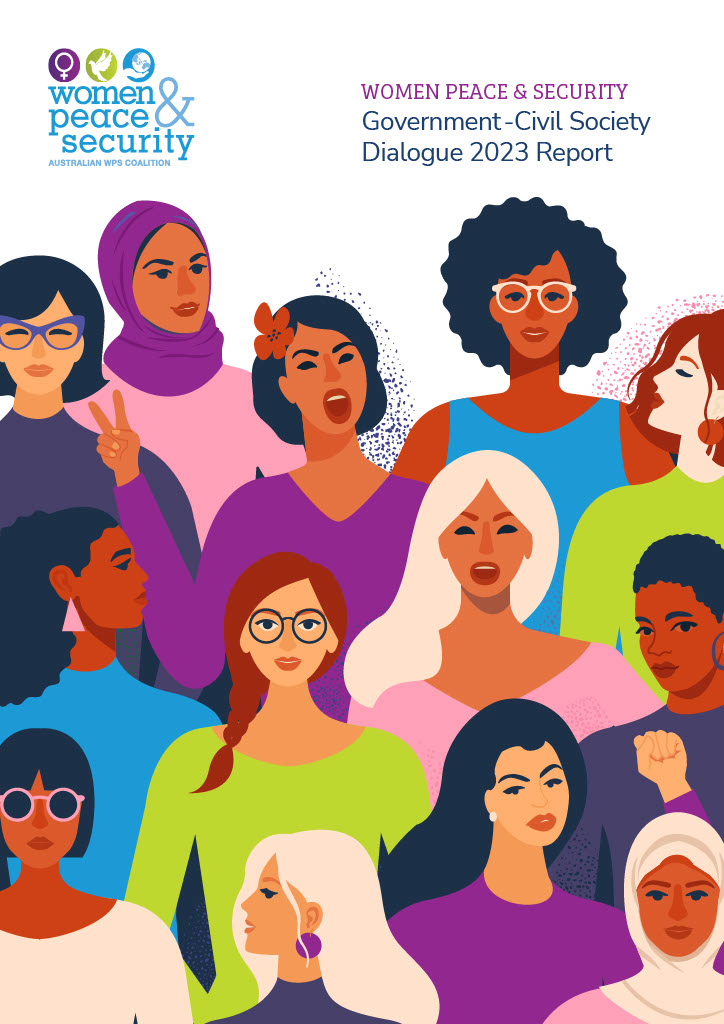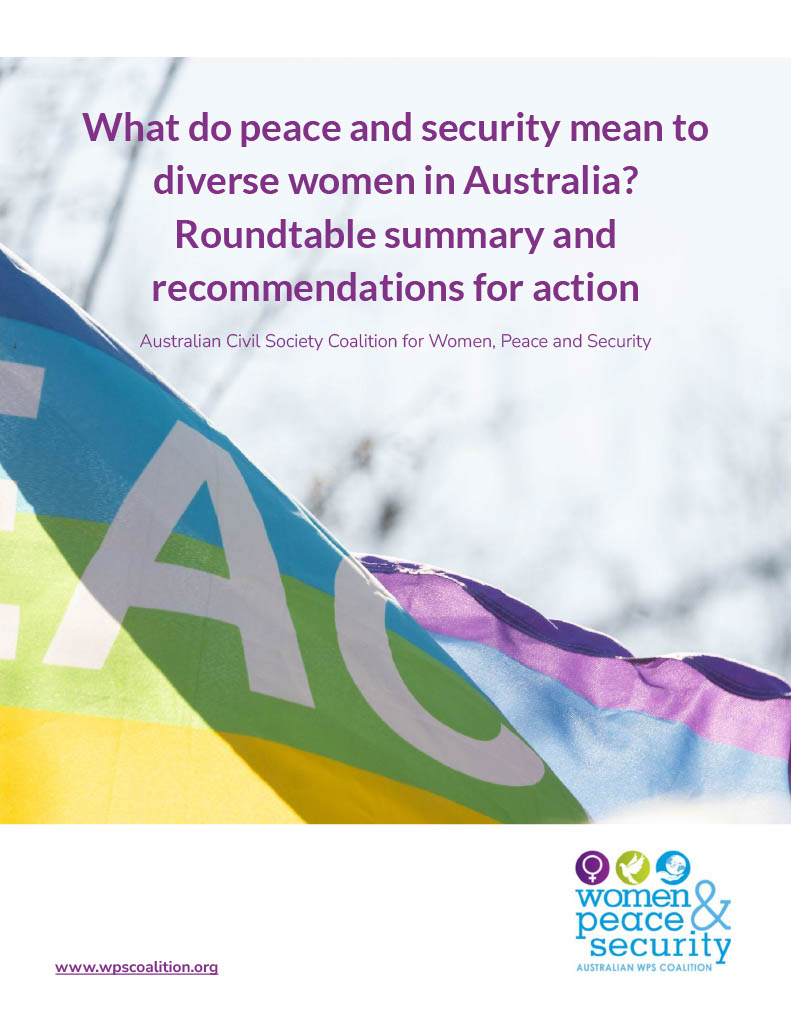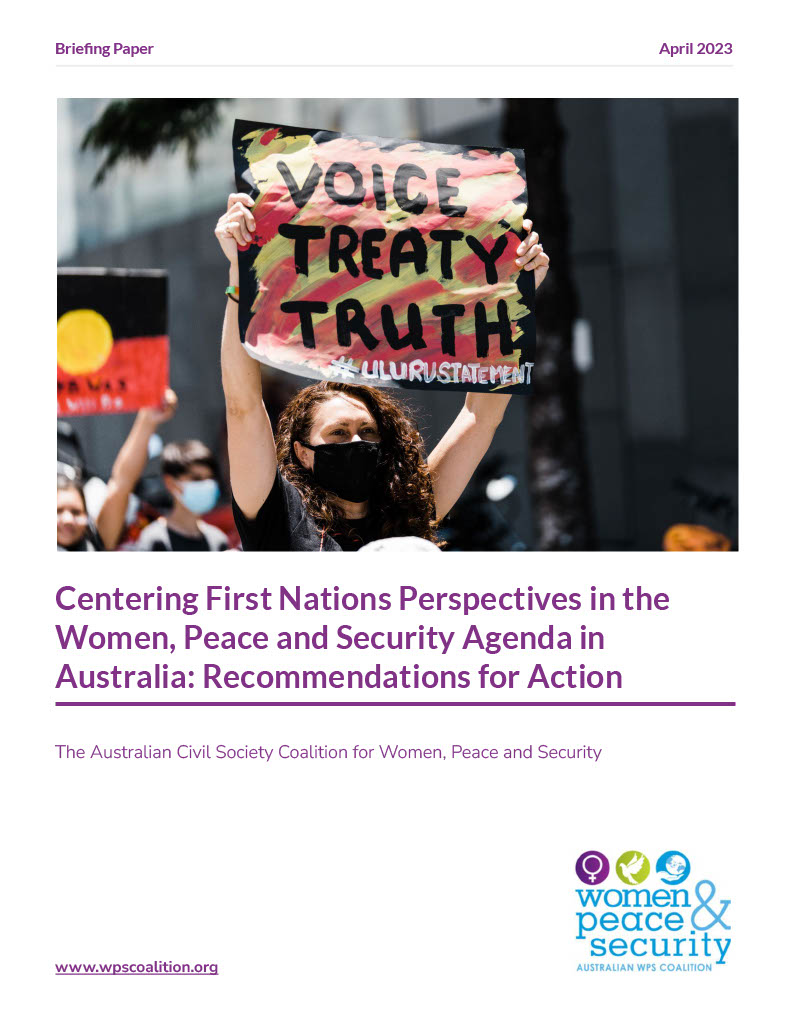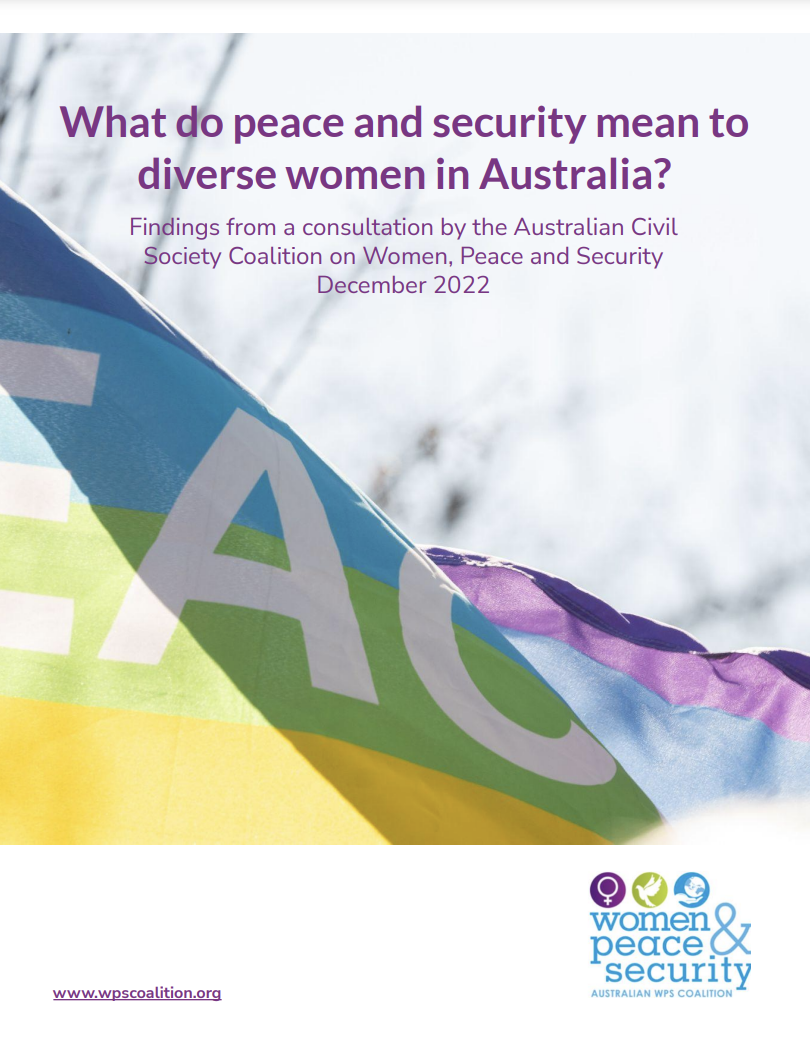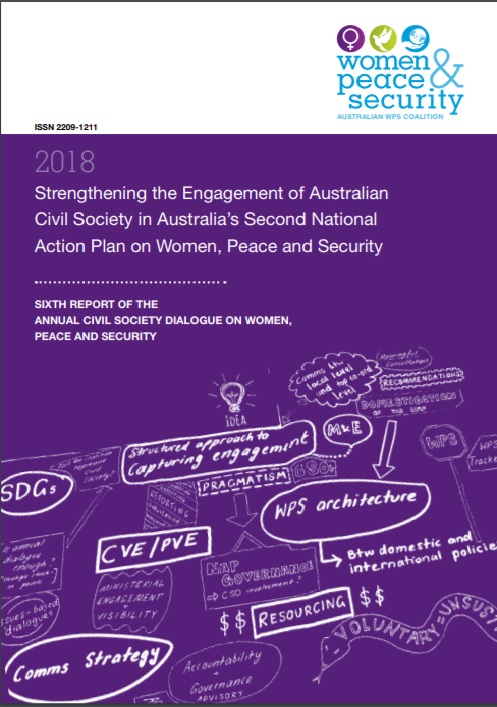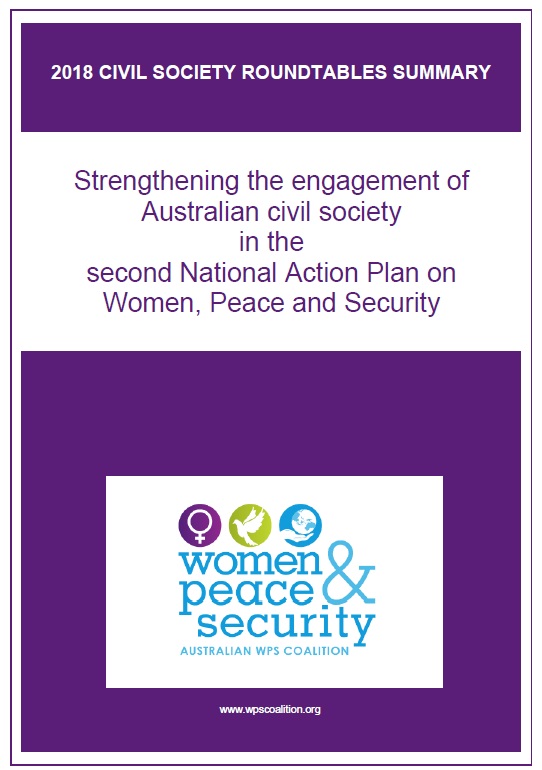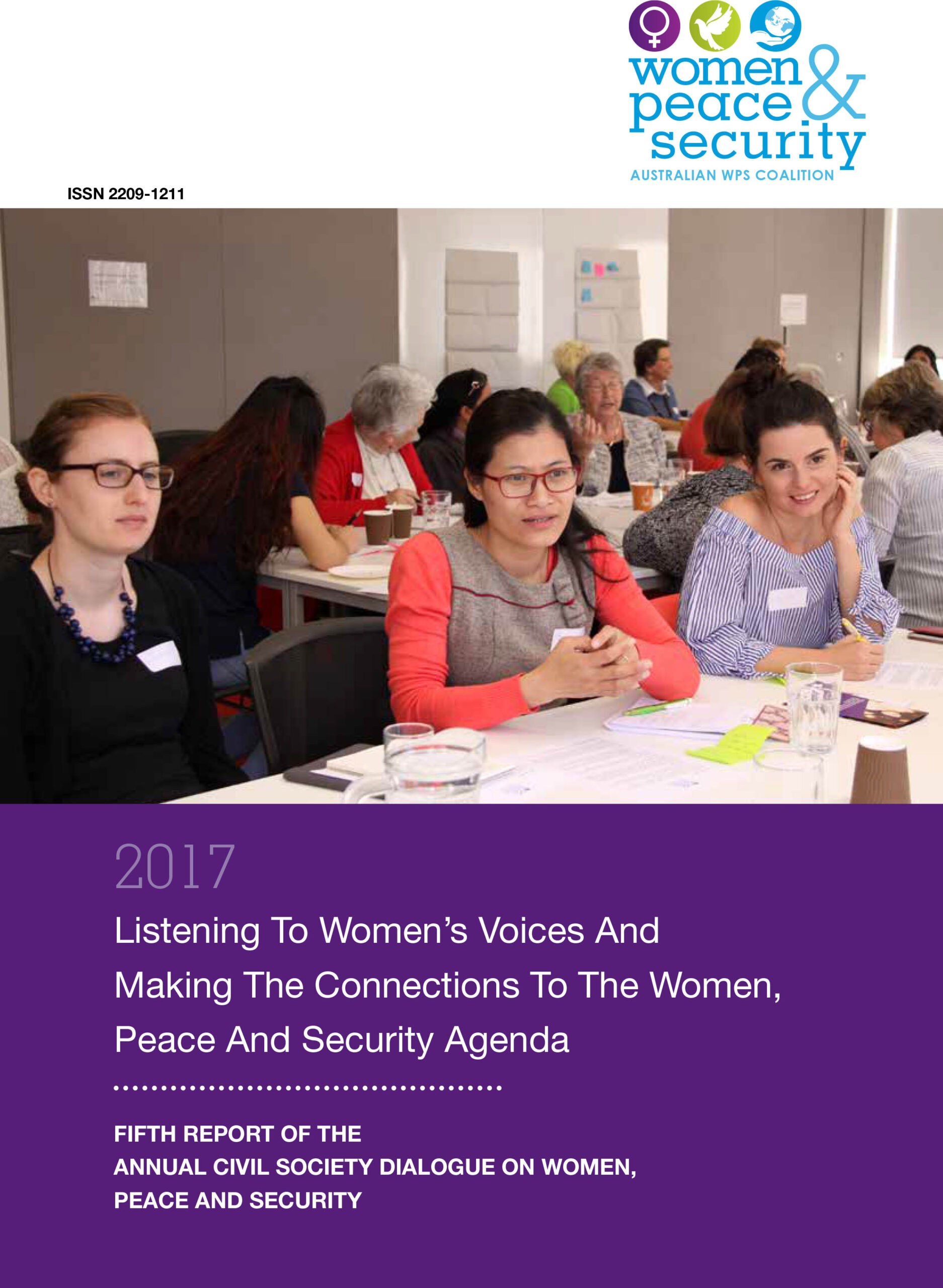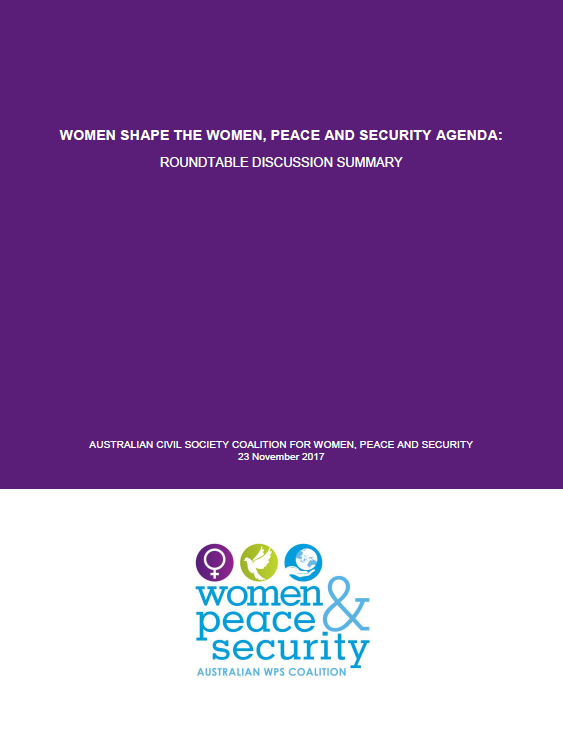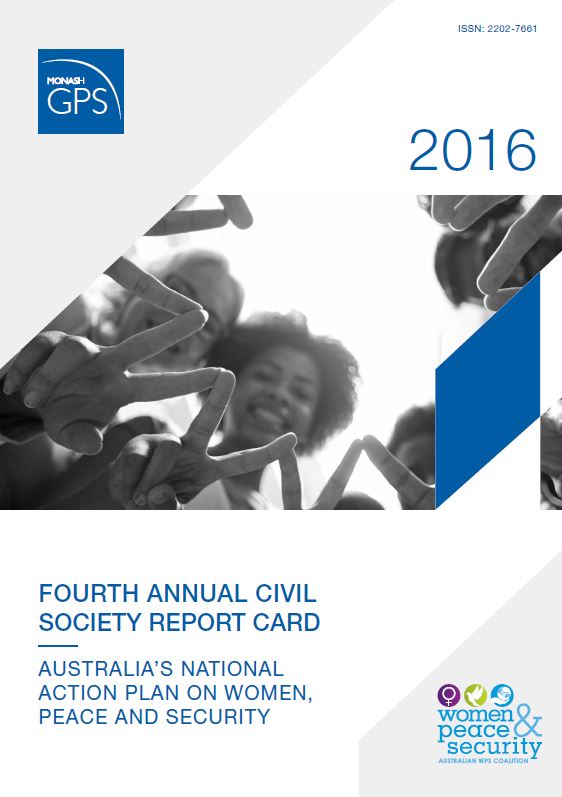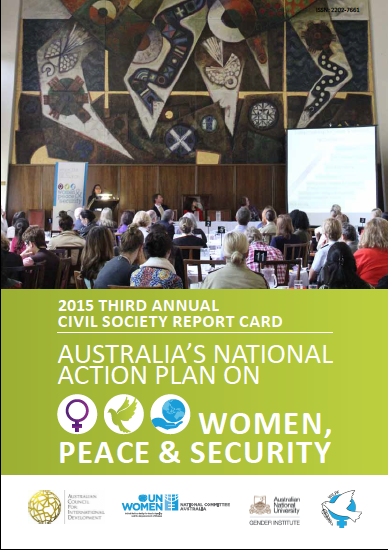Women, Peace & Security Dialogues
The Civil Society Dialogue on Women, Peace and Security brings together civil society, government and policy makers to discuss women, peace and security and to contribute to effective implementation of the National Action Plan on Women, Peace and Security. To date the Dialogue has aimed to:
– Showcase the contribution of civil society organisations to the women, peace and security agenda in the context of UNSCR 1325.
– Facilitate effective dialogue between civil society and the Australian Government on women, peace and security in the context of UNSCR 1325.
– Support shadow reporting on the Australian National Action Plan on Women, Peace and Security.
– Elevate the national discussion on women, peace and security.
2024
Women Peace and Security Government-Civil Society Dialogue Report
The Women Peace and Security Government-Civil Society Dialogue 2023, organised by the Australian Civil Society Coalition on Women, Peace and Security in collaboration with the Australian Civil-Military Centre (ACMC) and the Department of Foreign Affairs and Trade (DFAT), convened participants to discuss the implementation of Australia’s Second National Action Plan on Women, Peace and Security 2021–2031. The dialogue provided a platform for implementing agencies, civil society organisations, women’s rights advocates, and WPS experts to address opportunities and challenges in advancing the goals of the WPS NAP. Key insights and recommendations emerged from discussions aimed at driving effective implementation and promoting women’s inclusion in peace and security efforts. This report highlights the outcomes and key takeaways from the dialogue, underscoring the commitment to advancing women’s rights and peacebuilding in Australia and beyond.
2023
What do peace and security mean to diverse women in Australia? Roundtable summary and recommendations for action
The Coalition is in the process of delivering a multi-year project, funded by the Australian Civil Military Centre, designed to support civil society dialogue and engagement on WPS as part of the implementation of Australia’s Second National Action Plan on Women Peace and Security (2021-2031). Details on the first phase of the project (October-December 2022) and it’s findings were published in a report available here.
The second phase of the project involved an in-person Roundtable in Sydney, where Coalition members and partners gathered to develop recommendations for the Australian Government. These recommendations focus on five priorities identified in the broader consultation: achieving peace and security for all Australians, reshaping Australia’s role as a peacemaker, restructuring departments for global diplomacy, empowering diverse women and gender diverse individuals, and addressing climate change. The report aims to include inputs from partner organizations representing diverse women who couldn’t attend the Roundtable. Involving women and gender diverse people is crucial for the Women, Peace, and Security (WPS) agenda, as their perspectives strengthen efforts for peace and security. Recommendations contained in this report are not intended to represent an exhaustive list. Each recommendation includes (in brackets) a suggestion for the Australian Government departments and agencies with responsibility for taking it forward.
Further and regular consultation is warranted to ensure that Australia’s policy and action on WPS is shaped by the perspectives and priorities of diverse women, girls and gender diverse people.
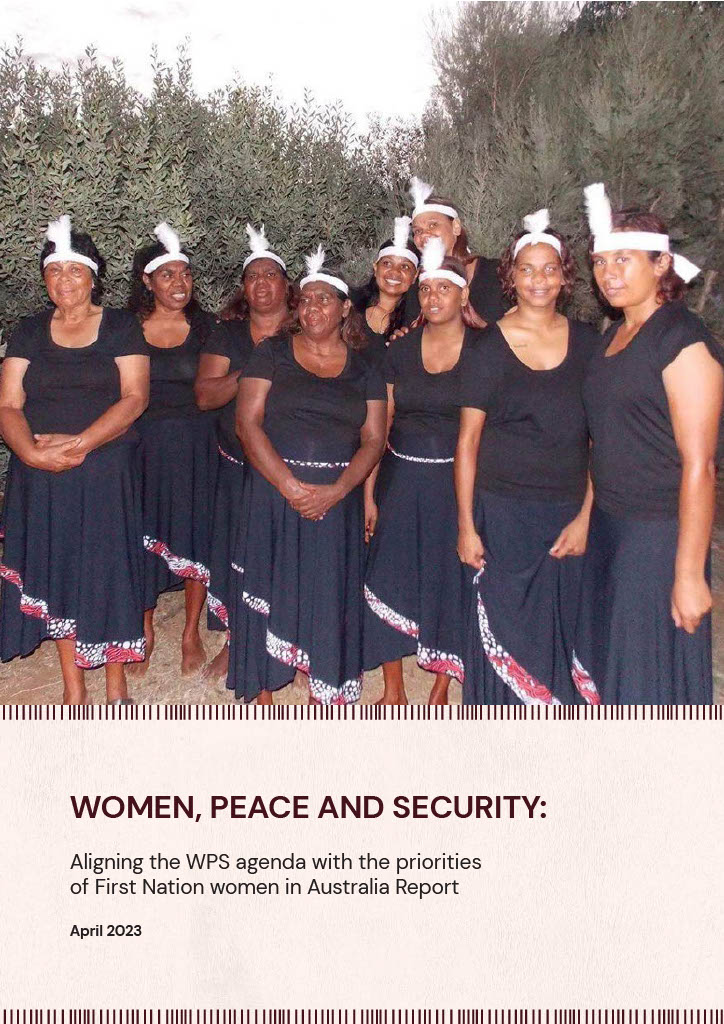
Centering First Nations Perspectives in the
Women, Peace and Security Agenda in
Australia: Recommendations for Action
In October 2022, the Australian Civil Society Coalition (the Coalition) undertook consultations with women and gender diverse people across Australia, to explore their perspectives on peace and security and priorities for action. Participants in the consultation raised a variety of challenges facing First Nations women, who are disproportionately impacted by conflict and insecurity. The unique peace and security issues faced by First Nations women in Australia were a strong emerging theme and warranted further exploration.
As a result, in March 2023, the Coalition engaged Professor Sandra Creamer, to carry out additional research focused on the perspectives of First Nations Women. Professor Creamer conducted yarning, individually and in yarning circles, with 50 First Nations women from across Australia. Yarning is an Indigenous methodology based on storytelling with similarities to semi-structured interviews, and which recognises the strong oral communication preferences of Indigenous peoples
This paper summarises the responses to both consultations in the hope of serving as a foundation for embedding the WPS agenda within Australia’s First Nations Policy. First Nations perspectives are often overlooked in discussions related to the Women, Peace and Security agenda and the Coalition hopes to help bridge the gap in policy and research by amplifying the diverse voices and lived experiences of First Nations women.
2022
What do peace and security mean to diverse women in Australia? Consultation findings
The Coalition is in the process of delivering a multi-year project, funded by the Australian Civil Military Centre, designed to support civil society dialogue and engagement on WPS as part of the implementation of Australia’s Second National Action Plan on Women Peace and Security (2021-2031). The first phase of the project involved a consultation to explore understandings of peace and security amongst women and gender diverse people in Australia, how perceptions of peace and security have been shaped by the changing national and global context, and what action diverse communities want to see the Australian Government take to build a safer and more peaceful world. The responses gathered through the consultation process have yielded a rich seam of data, which is outlined in this report and will inform the second phase of the project, aiming to generate detailed recommendations to inform the implementation and monitoring of Australia’s second National Action Plan on WPS.
2018
Strengthening the Engagement of Australian Civil Society in Australia’s Second National Action Plan on Women, Peace and Security
The sixth Annual Civil Society Dialogue report provides clear recommendations on how to strengthen this engagement. The Second National Action Plan is still in the early stages of development. The critical issues, recommendations, and implementation options presented in this report, therefore, provide a timely and useful resource for the development of second National Action Plan during 2019. They offer a clear articulation of principles, processes, and mechanisms that will promote and strengthen ongoing engagement between civil society and the government.
2018 Civil Society Roundtable Summary
The Australian Civil Society Coalition on Women Peace and Security (the WPS Coalition) as part of its 2018 Annual Civil Society Dialogue on Women, Peace and Security, organised Civil Society Roundtables in October 2018. The purpose was to engage with civil society organisations (CSOs) and diverse women to discuss what the role of civil society should be in the development, implementation and monitoring of the second NAP.
This report provides an overview of the key themes discussed at the Civil Society Roundtables, which will inform the Civil Society – Government Policy Dialogue on 29 November 2018. Summarised below are key recommendations from the Roundtables. The intention was to generate ideas for ongoing dialogue about processes/mechanisms within civil society and between civil society and government on women, peace and security.
2017
The Fifth Report of the Annual Civil Society Dialogue on Women, Peace and Security
“Listening to Women’s Voices and Making the Connections to the Women, Peace and Security Agenda”
Women Shape The Women, Peace And Security Agenda: Roundtable Discussion Summary
2016
The Fourth Annual Civil Society Report Card on Australia’s National Action Plan on Women, Peace and Security
Launched by the Australian Civil Society Coalition on Women, Peace and Security and Monash Gender, Peace and Security. Funded by the Australian Civil Military Centre.
2015
The Third Annual Civil Society Report Card on Australia’s National Action Plan on Women, Peace and Security
The release of the Global Study on the Implementation of UNSCR 1325 and the adoption of UNSCR 2242 offer renewed emphasis on the importance of women’s participation in conflict prevention and resolution, while ongoing conflicts in Syria and around the world provide daily reminders of the imperative of WPS implementation.
2014
The Second Annual Civil Society Report Card on Australia’s National Action Plan on Women, Peace and Security
Internationally Australia has promoted the WPS agenda during its term on the UN Security Council and at the Global Summit on Ending Sexual Violence in Conflict, while at home Government departments have taken measures to mainstream the WPS agenda into their policy and programs.
2013
The First Annual Civil Society Report Card on Australia’s National Action Plan on Women, Peace and Security
Released in 2012, it aims to bring together actors across the Australian Government and civil society to ensure that both domestically and when we act overseas, Australia listens to and includes the voices of women in defence, peace and security initiatives.

